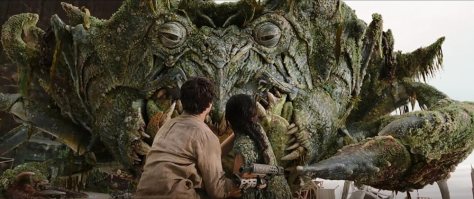
If Reign of Fire was a purely 2002 vision of the apocalypse, Love and Monsters is its late 2010s counterpart, the same basic story with a completely different approach. Where Reign loudly communicated its era by draining itself of colour and humour and having only vague self-awareness of the limitations of its CGI effects, L&M reflects its own by saturating itself with bright cartoon hues and quippy narration and CGI that has become so advanced and widespread that its generally seamless integration feels almost effortless (in fact, it received an Academy Award nomination for Effects.) The interesting contrast between these two movies might be further bolstered by eerie coincidence: Reign took place in a decimated world in 2020, while L&M was released in the midst of a decimated world in 2020, which mostly killed its theatrical run minus a few small-scale screenings and left it to become a perennial item in the Netflix back catalogue. In short, choosing to watch these two in close proximity definitely gave me even more to think about.
Continue reading Love and Monsters (2020)

